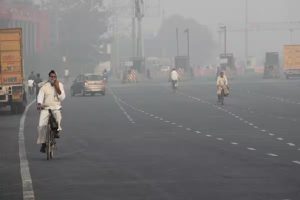
Delhi Air Quality: A Slight Improvement, But Still a Cause for Concern
Delhi’s air quality has improved marginally from ‘severe’ to ‘very poor’, but residents are still grappling with hazardous air conditions. This morning, the capital’s Air Quality Index (AQI) decreased from 461 to 398, but it remains hazardous.
Despite the slight improvement, the dense, toxic haze that continues to shroud the city is causing significant respiratory problems for residents. Many people are finding it difficult to breathe, and senior citizens and children are especially vulnerable to the harmful effects of air pollution.
The prevailing concerns about high levels of air pollution prompted Delhi Environment Minister Gopal Rai to seek the Centre’s intervention in reversing the city’s declining air quality. He highlighted the severity of the situation, noting that 12 districts in neighboring Haryana and 14 locations in Rajasthan are also experiencing severe air pollution.
To tackle the problem, the Environment Special Secretary is leading a 6-member task force, ensuring GRAP rules are implemented and monitored effectively. Additionally, the government’s National Clean Air Programme (NCAP) tracker has analyzed PM 2.5 (fine particulate matter) data for 11 capital cities, revealing that nine of them recorded higher pollution levels in the first 12 hours after Diwali celebrations this year compared to last year. Delhi experienced the highest spike, recording a PM 2.5 concentration of 999.5 ug/m3 at Pusa on November 13 at 1:30 am.
The alarming situation demands immediate action; we must do more to tackle air pollution in Delhi and across India. The government must take stricter action to enforce pollution control measures, and citizens must also play their part by reducing their own contribution to air pollution.
Here are some things that individuals can do to help reduce air pollution:
- Use public transportation whenever possible.
- Avoid burning trash or leaves.
- Conserve energy by using energy-efficient appliances and turning off lights and electronics when not in use.
- Plant trees and vegetation, which can help to filter air pollutants.
By taking these steps, we can all help to create a cleaner, healthier environment for ourselves and future generations.
